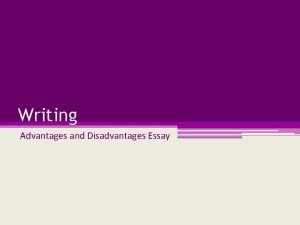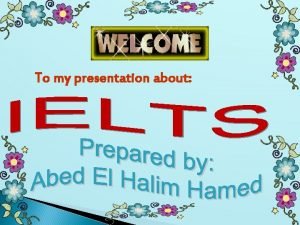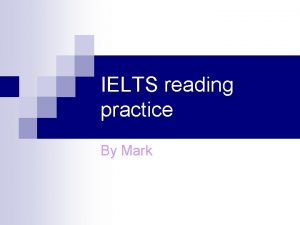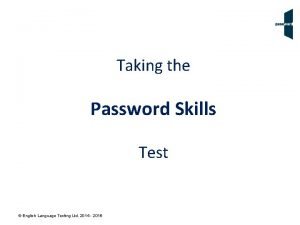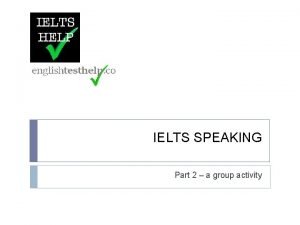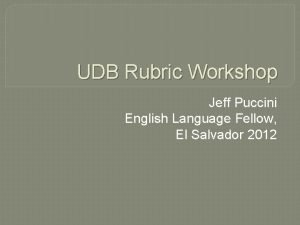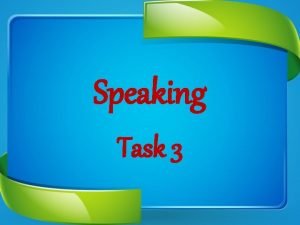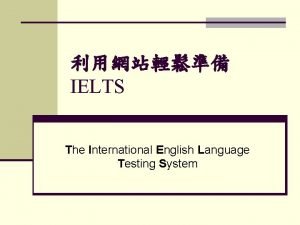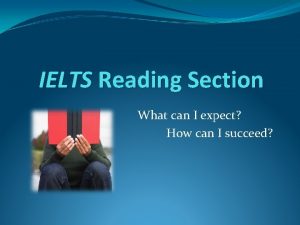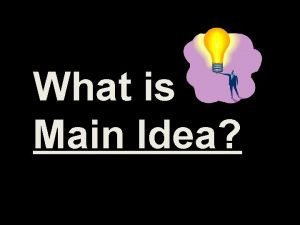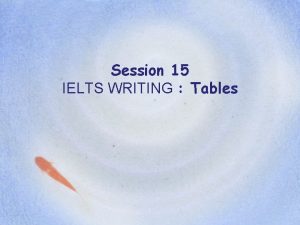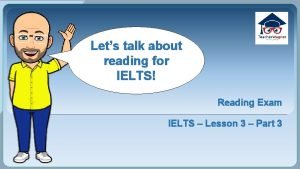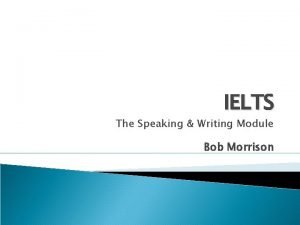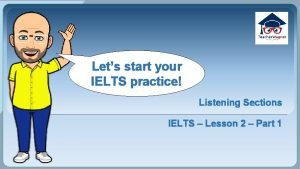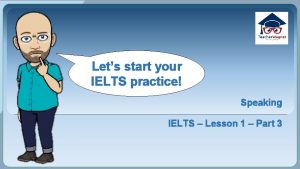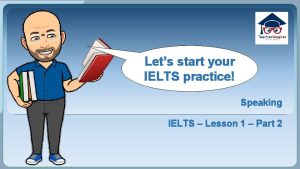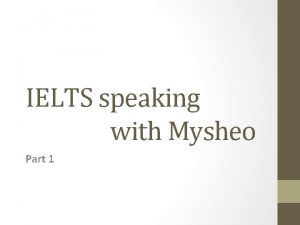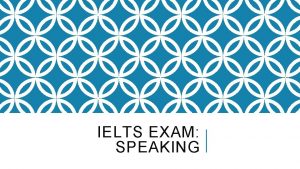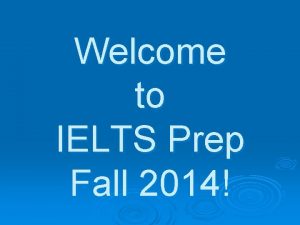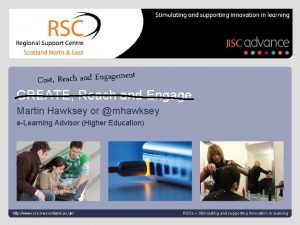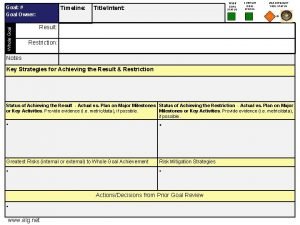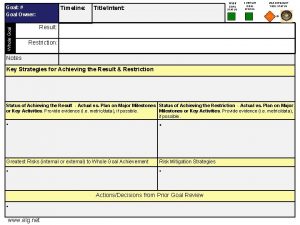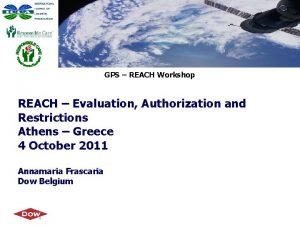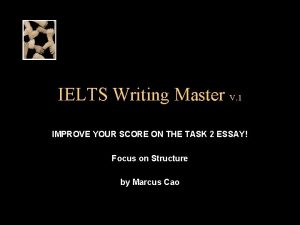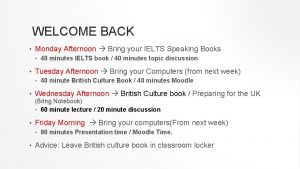Reach Your Goal with IELTS and How to
































- Slides: 32

Reach Your Goal with IELTS and How to Score High in the Listening Reading Test Presented By: Anjum Mishu Lecturer, Coordinator, IELTS Information Center for Females Department of English College of Arts for Girls, Abha King Khalid University www. ielts. kku. edu. sa

Overview • Why to take IELTS? • Modules • IELTS Test Format • The Listening Test • The Reading Test • 10 top tips for improving IELTS Scores www. ielts. kku. edu. sa

Why to take IELTS? • Designed to assess the English language ability of people who intend to study or work where English is the language of communication. • Use the online Global Recognition System on www. ielts. org to find out which institutions in the U. S. and worldwide will accept your IELTS scores. “IELTS gives us a • Test Result is valid for 2 years reliable indication of • A band score is awarded per subtest entry level. Other test are less satisfactory at • Band score ranges from 1 -9 proving this. ” • There is no passing or failing mark Kings College, UK www. ielts. kku. edu. sa

Modules • The Academic test is for candidates interested in studying. • The General Training test is for candidates interested in work and/or immigration. www. ielts. kku. edu. sa

IELTS Test Format Listening 30 minutes Academic reading General training reading 60 minutes Academic writing General training writing 60 minutes Speaking 11 -14 minutes Total Test Time: 2 hours 45 mints excluding breaks www. ielts. kku. edu. sa

Exam skills • practical skills • mechanics of the exam • timing Exposure Practice Analysis • language-oriented skills • knowing what’s expected • approach to tasks www. ielts. kku. edu. sa

IELTS test day advice Prepare for your test day: You will find the IELTS test centre staff friendly, welcoming and highly professional. They will make sure that the test is delivered fairly and securely. Follow their instructions carefully. The week before your test Check the start time and location of your IELTS test the week before, and make sure you know how to get there on time. Take the time to read full details of the ‘IELTS test terms and conditions’ for important information about your IELTS test day. www. ielts. kku. edu. sa

Your IELTS test day • You need to arrive in good time for your IELTS test. If you arrive late, you may not be allowed to take the test. • Switch off your mobile phone and any other electronic devices. You will be asked to place these with other personal belongings outside the test room. • Make sure you are prepared and have something to eat and drink beforehand. You will not be allowed to take food into the test room; you will only be allowed to take a drink in a transparent bottle. • The IELTS test location staff will check your identity when you arrive. • Make sure you have the right ID with you. If you arrive with the wrong ID, you will not be allowed to take the test. www. ielts. kku. edu. sa

Listening Test Timing: approx. 30 minutes + 10 minutes transfer time Questions: 40 items Test Parts: 4 sections Section 1: conversation between two people set in everyday social context Section 2: monologue set in everyday social context Section 3: conversation between up to 4 people set in an educational or training context Section 4: monologue on an academic subject Real-world listening situations www. ielts. kku. edu. sa

Listening Test Types of questions: multiple choice, matching, plan/map/diagram labelling, form and note completion, table completion, flow-chart completion, summary completion, sentence completion, shortanswer questions Skills Assessed: • Understanding of main ideas and specific factual information • Recognising opinions, attitudes and purpose of the speaker • Following development of an argument www. ielts. kku. edu. sa

Listening: Common difficulties • CD is played only once • time given to read the questions is too short • answers come too quickly in the recording Solutions: • Think about the context before you listen and identify the type of information you will need to listen for • Read the questions before you hear the text and use the time between each section to prepare for the following section. www. ielts. kku. edu. sa

IELTS Listening Tips Read the instruction • Try and predict answers before you listen • Check the maximum number of words allowed • Make sure you know what to do www. ielts. kku. edu. sa

IELTS Listening Tips Synonyms are important • Underline Key words in the questions • Predict synonyms before you start listening www. ielts. kku. edu. sa

www. ielts. kku. edu. sa

IELTS Listening Tips Be aware of the distracters • Don’t write the first thing that sounds right. • Sometimes the correct answer comes later www. ielts. kku. edu. sa

IELTS Listening Tips Think about the topic www. ielts. kku. edu. sa

IELTS Listening Tips Write your answers carefully • If in doubt, write down full words not abbreviations • Check spelling and grammar when you transfer your answers. • Write the word you hear. Don’t rephrase • Use symbols such as decimal points and currency signs www. ielts. kku. edu. sa

IELTS Listening Tips If you get lost, don’t panic • Listen for Key words, look at the questions, find your place again • ü ü ü Use your 10 minutes at the end to……. Transfer your answers to the answer sheet Check your answer Attempt any questions you missed (guess if necessary! www. ielts. kku. edu. sa

Reading Test Timing: 60 minutes no transfer time Questions: 40 items Test Parts: 3 sections Types of questions: multiple choice, identifying information (True/False/Not Given), identifying writer’s view/claims (Yes/No/Not Given), matching (information, headings, features, sentence endings), sentence completion, summary completion, note completion, table completion etc www. ielts. kku. edu. sa

Academic Reading Test • Texts are authentic and taken from books, journals, magazines and newspaper 3 sections with a total text length of 2, 150 -2, 750 words • Written for non-specialist audience and are on academic topics of general interests • Text range from descriptive and factual to discursive and analytical • May contain non-verbal materials such as diagrams www. ielts. kku. edu. sa

GT Reading Test • Section 1 contains two or three factual texts. Topics are relevant to everyday life in an English-speaking country. • Section 2 contains two factual texts focusing on work related issues • Section 3 contains one longer, more complex text on a topics of general interest. • Text are authentic taken from notices, ads, company handbook, books, magazines, newspaper and official document www. ielts. kku. edu. sa

Reading Test Skills Assessed: • Reading for gist • Reading for main ideas • Reading for detail • Understanding inferences and implied meaning • Recognising a writers opinion, attitudes and purpose • Following the development of an argument www. ielts. kku. edu. sa

IELTS Reading Tips www. ielts. kku. edu. sa

IELTS Reading Tips Skim the text and questions • Don’t start by reading the whole text • Read the first paragraph • Read the first question of each paragraph • Read the last paragraph • Look at the questions www. ielts. kku. edu. sa

IELTS Reading Tips Remember the synonyms will be used so don’t expect to find the exact word in the text www. ielts. kku. edu. sa

IELTS Reading Tips Multiple Choice Questions • Number of choices will be changed. – read the instructions carefully. • Use commonsense to eliminate obviously wrong answers • If you’re not sure, guess www. ielts. kku. edu. sa

IELTS Reading Tips True/false/not given questions • Don’t confuse “false” and “not given” • False – we know from the text that the statement is untrue • Not given – the text does not contain the information necessary to decide Look for synonyms, not exact matches www. ielts. kku. edu. sa

IELTS Reading Tips Is there any difference between Yes/No/Not Given and True/False/Not Given Yes, there is a small difference. When the statements are about facts in the passage, you'll be asked to decide whether the information is "true, false or not given". While in the “Yes/No/Not given” questions, you are asked to look for the writer's claims rather than the actual information. Understanding the instructions carefully is a way to define whether the statement is a fact or just an opinion. www. ielts. kku. edu. sa

10 top tips for improving IELTS Scores 1. 2. 3. 4. 5. Remember it is a test of your English language ability. The better your English language skills, the easier it will be to approach the test. Concentrating on IELTS books and IELTS practice tests alone is not the best way to prepare for the exam. Use the language around you. If you are in an English speaking country then this is easy. If not then use the internet. If you have the chance, join an English speaking club where you can practise your speaking regularly (this could be a book club, cultural exchange or a hobby club) – or start one yourself with other ‘IELTS’ friends and have one rule – ‘English only’! See if you can invite native speakers to give short talks at your meetings. It will give you chance to evaluate yourselves and set up a goal for further improvement. www. ielts. kku. edu. sa

10 top tips for improving IELTS Scores 6. Do one English activity every day – listen to the radio, watch a documentary, read a magazine or newspaper article, have a conversation in English. Make it something that you are interested in and then ENJOY it! 7. Volunteer to do something where you have to speak English – read to the children at your local primary school, help some high school students with their English etc 8. Join an online community. There are several to choose from, try out a few and see which you like. 9. Practise little and often. Choose one activity at a time – for example reading, and really concentrate on that during your daily practice. 10. Make sure you understand why things are wrong, go over any mistakes and learn from them. If you have a lot of mistakes then do the exercise again. www. ielts. kku. edu. sa

How to register? The IELTS Center is in Building “A”, Entrance # 1, Floor 3, Room number A/3/3, Main Campus, KKU, Abha. Phone: +966 -(0)17 -2418119 Email: ielts@ekku. edu. sa OFFICE HOURS FOR PUBLIC: Sunday – Thursday: 7 AM – 1 PM. The office is closed on Fridays and Saturdays and all statutory holidays. Directions from the main entrance to the IELTS office: Enter through the security checkpoint from the main entrance into the Gregour campus. At the roundabout, make a left. Gate 1 in Building “A” is located almost at the end of Building “A”. Be aware that parking lots can fill up quickly. Walk through “Gate # 1. Take the elevator or stairs up two floors. Exit the elevator/ or stairs and turn right. The IELTS office is the last door on the right (A/3/3). www. ielts. kku. edu. sa

Register Now! The world is waiting! www. ielts. kku. edu. sa
 Booming” your voice to reach all listeners.
Booming” your voice to reach all listeners. How to reach the unchurched in your community
How to reach the unchurched in your community Unit 8 fashion and design ielts answers
Unit 8 fashion and design ielts answers Writing essay advantages and disadvantages
Writing essay advantages and disadvantages Review and revise your tentative goal statement
Review and revise your tentative goal statement Q scores meaning
Q scores meaning Ielts grading scale
Ielts grading scale Ielts abbreviation
Ielts abbreviation Ielts test scores
Ielts test scores Disadvantan
Disadvantan Ielts reading introduction
Ielts reading introduction Better think ielts
Better think ielts Www ielts org
Www ielts org Password skills test practice
Password skills test practice Mail @ ielts-kku.info
Mail @ ielts-kku.info Ielts speaking topics with answers
Ielts speaking topics with answers Ace the ielts
Ace the ielts Ielts cerf
Ielts cerf Eco tourism pros and cons
Eco tourism pros and cons Pembersihan karang gigi
Pembersihan karang gigi Idp ielts
Idp ielts Ielts exam net reading
Ielts exam net reading Ielts
Ielts The lake erie canal ielts reading answers
The lake erie canal ielts reading answers Ielts listening test
Ielts listening test Ielts
Ielts Let's talk about reading
Let's talk about reading Ielts with bob
Ielts with bob For my winter vacation ne demek
For my winter vacation ne demek Soas ielts
Soas ielts Language
Language Mrcp paces in pakistan
Mrcp paces in pakistan Ielts 6,0
Ielts 6,0



